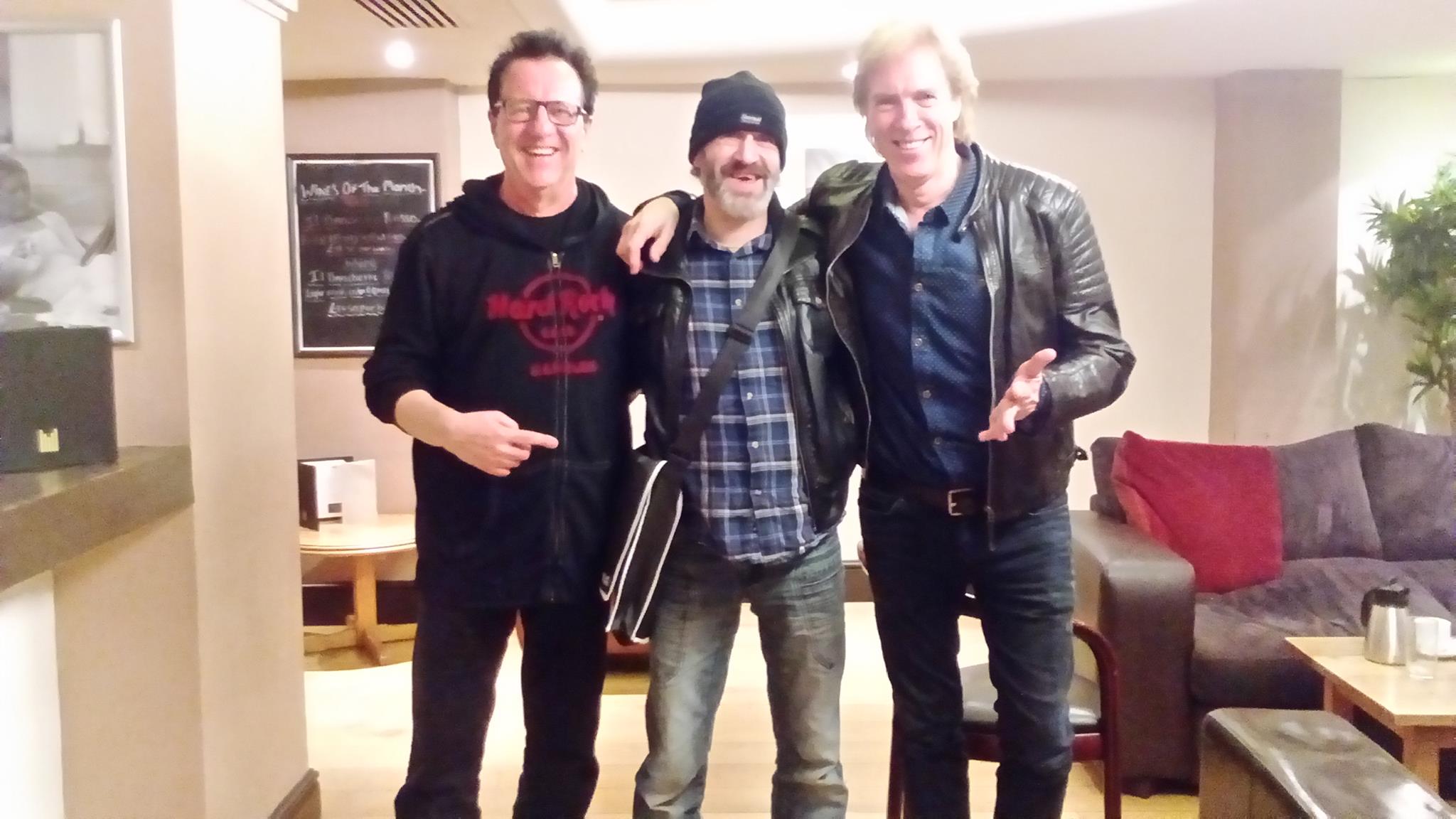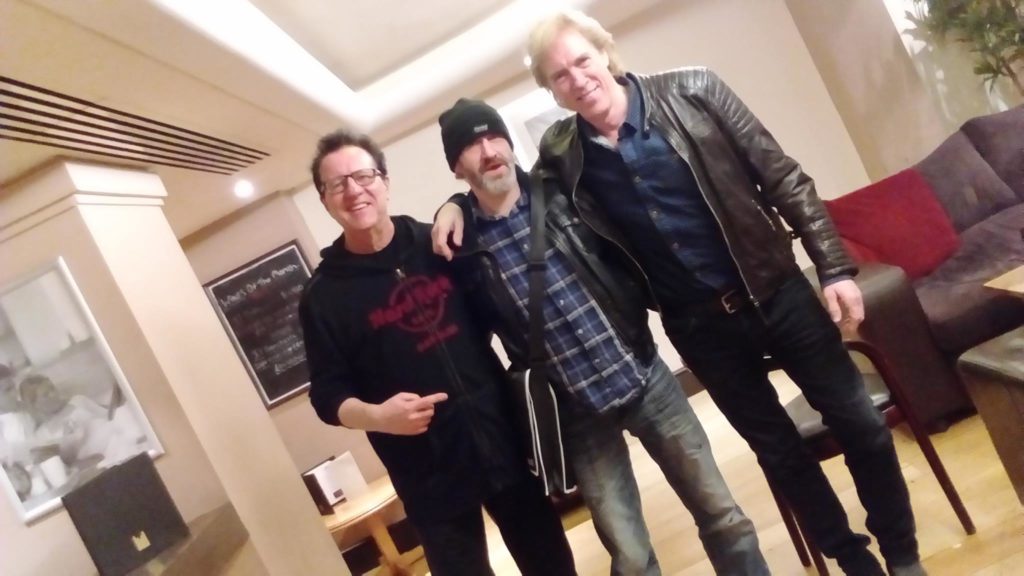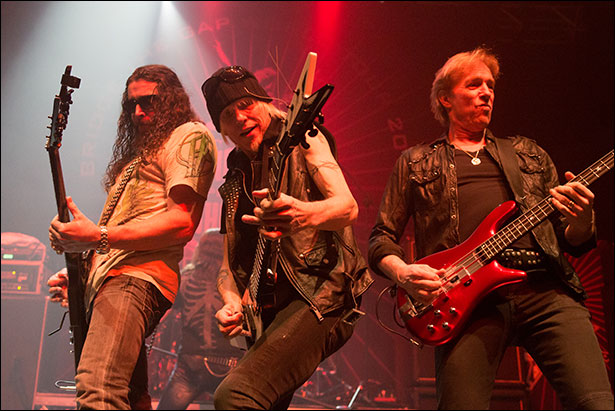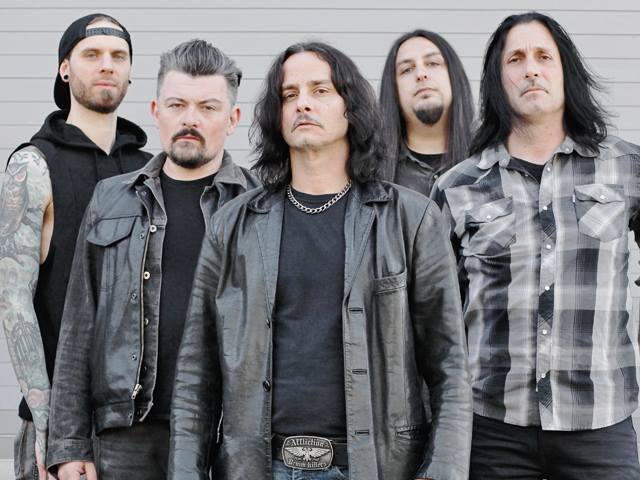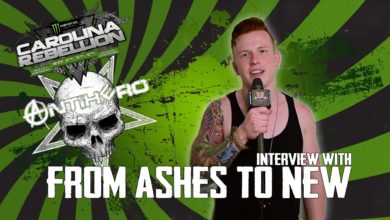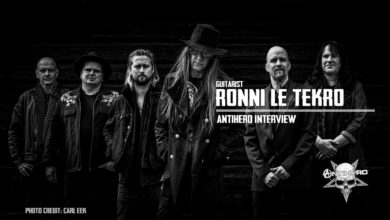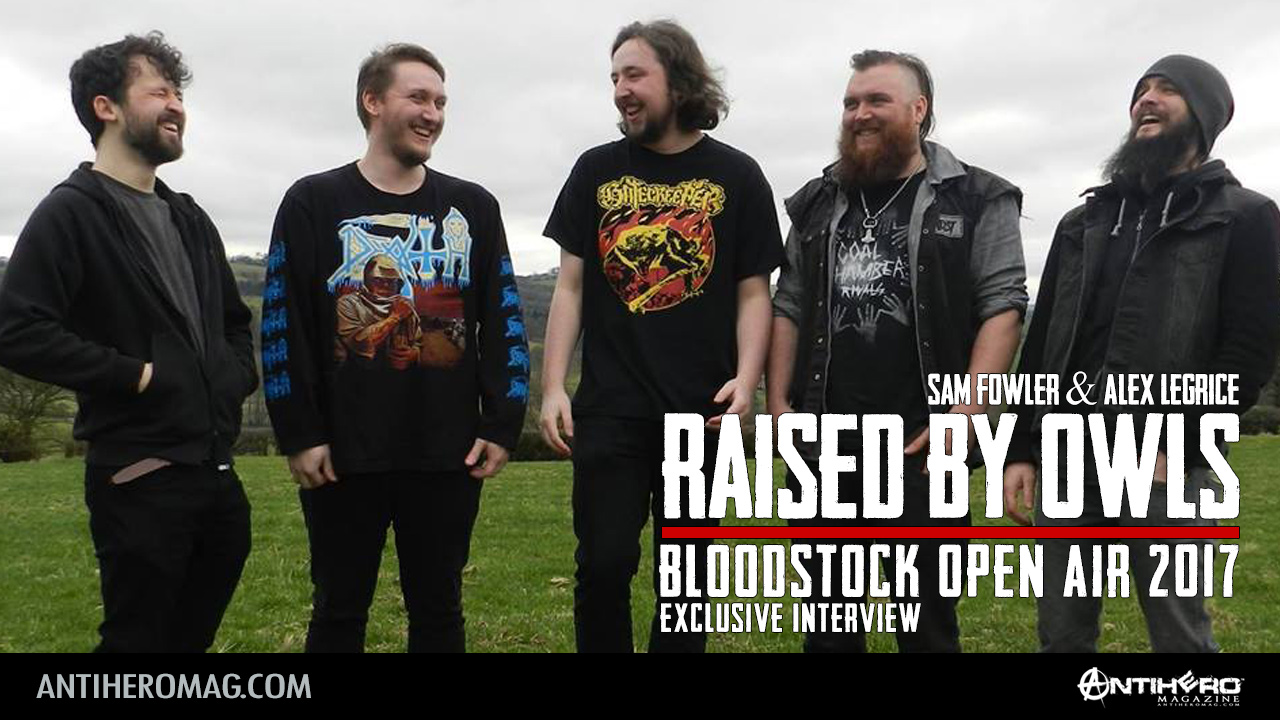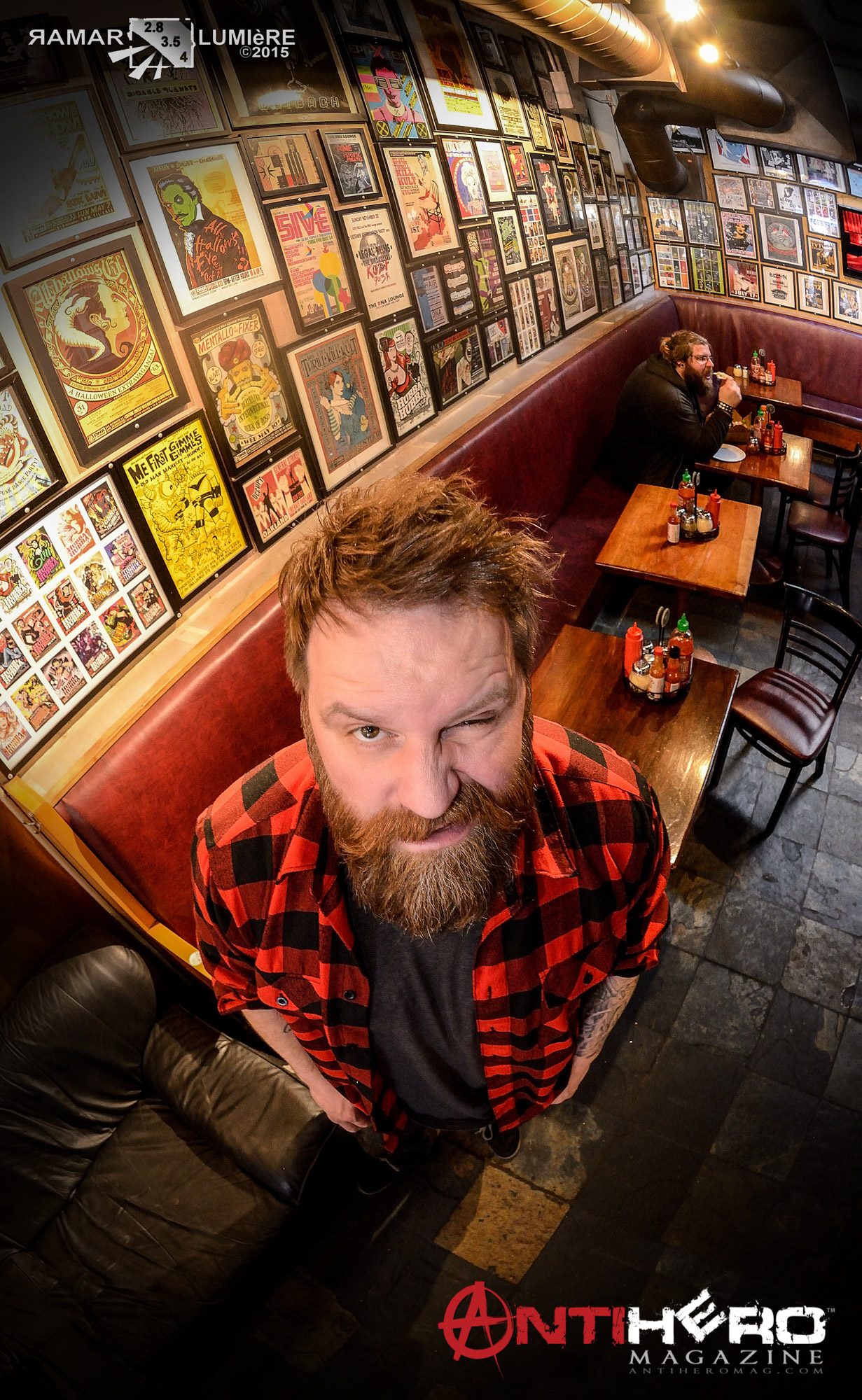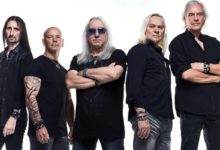Interview with ex-Scorpions Alumni Herman Rarebell and Francis Buchholz of TEMPLE OF ROCK
Interview by Mark Dean
[separator style=”line” /]How did you both reconcile musically with Michael after so many years apart?
Herman Rarebell: There was no suggestion and no help so that’s why I jumped in to do this for one tour only, and I asked him via Francis as we haven’t talked in years. So anyway, we talked and talked – everything is fine to make a long story short – and then Francis joined the band and also Doogie our lead singer. So, from 2011…2012, sorry, the band Temple of Rock was basically formed and plays under the same line up since.
Which is good, a continuity of the band’s lineup. What is your first musical memory that you can recall?
HR: This, tapping on cups, and my mother told me – and usually it happened in the kitchen, when I was four or five years old, though I can’t think back, I can remember all of this – it got on my mother’s nerves. My mother bought me a pair of brushes, the brushes drummer’s used in those days, it was fashionable, and my grandfather said “don’t give him this, it maybe will go way into his flesh and blood.”
Was it difficult in the early days of the Scorpions to break out of your home country and go on to achieve world fame, really? To breakout, first of all to make a name in Germany, and then spread it all over the world?
HR: Yes, it’s a lot of work involved. We did our own management and we started out in Hanover where we are from. We played, started in Germany, booked everything ourselves, then we got somebody to help us with the booking and we could play in Holland, Belgium, France. We did our first tour in the UK in 1975. So it was a lot of work building and playing in those clubs. And the tour in 1975 I still recall we did earn so little money that we had to stay the night in guest houses, in the cheapest guest houses we could get with youth beds. What can you do when you have to sleep in a bed with blankets which were not that clean? After the tour I was ready to quit.
How do you look back at the musical history and the legacy that you’ve created together?
HR: It was a wonderful time. We played the so called “heavy rock” music before the term was invented, “heavy rock.” But I can’t complain. Speaking for myself, I’m very happy with my music life so far and it’s great to go back 50 years. I started when I was about 12 or 13, and now I’m 66.
Does it make you proud?
HR: Yes, of course, it does make me proud. It makes me proud every night when I see all those happy eyes, and also this is two, three generations now coming to see you. You usually see a father who’s maybe my age bringing his son, and the son again brings his daughter.
And how do you explain the joint appeal of classic rock, and that it’s still popular today so many years later?
HR: It’s great music. It’s very simple, it’s handmade music. It comes from the heart and people feel that. I think this music is timeless.
It is, yes. My mum used to say to me when I was young with long hair and listening to you, “when are you going to grow out of that music?” She still tells me the same thing.
Talking about your musical legacy do you think looking back have you ever recorded a bad album?
Francis Buchholz: No, not really. The albums may start out to be bad – okay, you have the demos in a rehearsal place possibly not sung correctly or some unfinished arrangements are on that. You play something else. You play something which you change later on the recording. So, an album is basically a piece of work and you work on it and when it’s finished then you think, okay, we can have this better and we could change this and this? So basically, mainly it is from my point of view when the album is finished I’m not so happy with it. Do you know what I mean? Because we think we could have been better there and could have been better there. But I say it’s too close to the picture, and you can see the trees but you don’t see the forest. Looking back, I like everything.
Right, but there’s not an album that you would pick out now and listen to?
FB: No.
HR: One is better than the other let’s put it this way – more favourable.
FB: Yes, but we never ever let it go, we’ve never said, “it’s good enough” – do you know what I mean? We’re always fighting for the best results.
You both have written books. I just wonder, yours is more autobiography and yours is more technical to do with bass. I just wondered if you would ever write an autobiography or you would write something about drums?
HR: No, I’m not going to write another biography. I think it’s enough there, you know? And a book about drums? There are about 5,000 books about drums. I don’t think you need 5,001 books now.
One book was enough?
HR: Yes.
What about you, Francis? Would you not write a book about your own musical history?
FB: I have a book in preparation on my computer. It’s a long story about the rise and fall of the Scorpions or whatever it’s called, so I have no time yet, but it’s about the whole time and experiences so everything that happened and all the inside stories which nobody else has written about.
Is that just for yourself or something that you have designs on getting published?
FB: At the moment it’s for myself but when it’s finished I will approach a publishing company to publish it. We’ll have it translated in English.
Herman, I have read about the Monaco Records label that you had set up with the Prince of Monaco, is that still going or is it since closed down?
HR: No…
What happened there?
HR: That was 2001 where we got bank robbed because the big internet business came in and all the big companies like EMI disappeared…all those, as you know there’re only four big ones left now. There’s Sony, then there’s Universal, you have Warner Bros, and what is the fourth one? I think even three now.
It’s a whole different game now these days.
FB: Yes, I went out of business.
HR: This thing, the internet, basically put us not into business, but put us out of business because the big record companies who we produced for wouldn’t take our product anymore in the end because they said you can’t sell it anymore. So then we just stopped it in 2001. This was also the year I decided to leave Monaco and move back into Germany and then from there to England. Then this thing happened with the band. A lot of things happened in my life since.
What’s your view again on the whole business, the importance of social media, bands promoting themselves and getting more actively involved?
HR: Nothing stays the same, your whole life is changing, everything is changing. The music is changing. There are new people coming up, other people die, so nothing stays the same. You cannot expect when the first record was put on, how do you call it, turntable records, then we went to CDs, everybody said, “ah, CDs are much better!” Later on they found out the CD was not sounding as good as the vinyl.
The sound quality isn’t the same. I know people that are technically minded, and basically they said it’s not the same.
HR: And everyone listens to MP3s and to my ears it does not sound as good, but people don’t care. The internet is, from my point of view, a good thing because everybody can put up his program or his ideas into the internet and everybody can listen to it, or look at it if it’s a video, so you don’t need to go to a radio station, “please play my record.” You don’t need to do that.
It’s better in some ways and not so good in others.
HR: If people like that it’s good or if people don’t like it, okay. You can reach more people through the internet. That’s the whole thing nowadays, everything goes through the internet. For example, my wife buys nothing anymore from the shop. If she needs something she goes to Amazon and eBay. And afterwards you have everything you want. Every album, “boom,” like this. When social media came up, like Facebook, I thought, “what is this bullshit?” But everybody’s on Facebook now. When you look for somebody you find him on Facebook, you don’t find people anymore on the internet on websites.
With Temple of Rock’s most recent album, Spirit on a Mission, there was more and more new stuff being included in your set lists, your live set lists, I just wondered if you both can see a day when it’s going to be all Temple of Rock songs?
HR: We are doing quite a lot of the new material. The fans want to hear the old stuff as well. So it’s like trying to balance out. When we play too many things from the new album which nobody knows then people are disappointed because they want to hear some other stuff. We have so many songs to play now it’s not easy to make a selection.
FB: If we would not play “Doctor, Doctor” anymore, or “Rock You like a Hurricane,” or “Rock Bottom,” I think they would kill us.
Do you not get fed up though after playing songs like those many hundreds of times?
HR: No, I think they’re great songs and they’re all time classics, and you only look at the reaction of the audience when we play those old time songs, they flip out completely.
FB: When I play these songs I don’t go out and say, “oh no, I have to play this song.” I play it like a child which plays it the first time, do you know what I mean? That’s how it should be and when we don’t have that anymore then we had better stop playing music.
With regard to the setlist then, do you have input to that selection? Obviously by carrying Michael’s name I would assume that he would have final say. Do you guys – with particular reference to the Scorpions songs – say “let’s play that one, we haven’t done that one in a while” and swop them around?
HR: But mainly I’m not the setlist person. I don’t like putting together setlists. For example, “Another Piece of Meat” – we played it for so many years and everything, and it is time now to get this out. The same with “Armed and Ready.” So those are some songs that are overdone. It’s like if you eat every day lobster and after a while you don’t want to eat it.
It keeps it fresh as well for the fans who maybe go on different dates on the same tour if the band sometimes change things around.
HR: Some songs you can never leave out of a set list like “Rock you like a Hurricane,” “Doctor, Doctor” and “Rock Bottom.” Those three you’ll probably hear until we die. But we change the rest around to make it interesting this year. When people come this year again for the show they hear different song.
Yes, and some tours “Doctor, Doctor” was the last song, and then I saw a festival video and it was the opening song …mixing it up.
HR: Yes, things like that, yes.
I’m quite surprised Herman to read on Wikipedia that you’ve actually contributed to the song writing of a lot of the Scorpions songs. People may not recognize that contribution.
HR: Yes, I did.
Did you have input to the Temple of Rock song-writing process?
HR: No, with the Scorpions I started actually writing lots of lyrics on all the early albums. Later on because I did lyrics just sometimes – “Another Piece of Meat” for example. “Passion Rules the Game,” where I wrote lyrics and music, or music and then lyrics. Or on “Passion…” it was Klaus writing the lyrics. It just varied. Basically, I’m a lyric writer also. The band knew that so they said particularly Rudolph especially came up to me when he saw you have an idea you have an idea or Klaus maybe had an idea and then sometimes he had no idea, he said to me come on you have to find something…
FB: Herman always came up with great rock and roll lyrics.
HR: Yes, I lived that life at that time in the 80s. I had a very live rock and roll life so I knew about it.
FB: On this album the music was written by Michael and the lyrics were written by Doogie White, he’s a good literate writer and he has good, nice words. So we let him do it.
And how did you feel then when you got back with Michael for that first time in a rehearsal studio and there was a different singer at the mic for those Scorpion songs? Was that odd?
HR: Well, it is like this though, Klaus has a unique voice which cannot be replaced by anybody, you can hear 100 songs on the radio, and when a song comes on you know immediately this is Klaus Meine. So you have to take it as it comes.
Okay, you both chose to leave the Scorpions, looking back do you think that was a good choice or would you have maybe stayed?
FB: I had, at that time I had enough with the music business and I had children, my daughters were just born, my twin daughters, and I didn’t have the time to go and spend on yearlong touring and month long studio recordings. So for me it was a good moment to stop, do you know what I mean? Even though allegations which had been made against me from the band turned out to be wrong, there were things on the internet which are totally wrong. But I was 20 years in that band and I have helped, we built this band together. We built this city of the Scorpions. We built this mothership of the Scorpions together.
FB: Things happen in your life, you go a different way and that’s life, that’s how life is. I go, I cross the street and somebody says, “should I have not taken that road, that street, or that route,” No, things are as they are.
HR: And for me it was like I felt that, after 20 years, the highest musical points had been reached by that time and when you listen to the album, the ‘94 album, for example, Face the Heat, that was still really a new sounding album. It was then, as you know, that I felt that all the highs had been reached. We played every arena, we played every stadium, and we had the biggest hits. One of which was “Rock You Like a Hurricane,” so I’ve felt musically there was nothing to say anymore. I felt I had done everything so I felt it was time to do something else. At the same time the offer came from Prince Albert, I lived in Monte Carlo, and he said to me come on.
That was a surprise too.
HR: He’s a friend of mine since that time he was not like a prince to me or the boss of Monaco he was like my mate and he came to my house and we played drums together. He’s a very good drummer, but he cannot be a drummer, he has to run the country and for him that would be a better choice.
FB: That’s right, the chemistry we had with these five people with the classic Scorpions that was destroyed, from my point of view, when I left the band. The next album was only halfhearted to me – then Herman left, and then to me nothing happened anymore.
HR: So that was not the Scorpions anymore and nothing really happened after that.
I think a lot of fans feel that as well.
HR: Yes, they do. Even to this day I get emails saying, “why don’t you go back?”
FB: Why did Scorpions become so successful in the 80s? It was the chemistry between these five men, or five boys, however you want to say it. And that’s what people believed in. And when that was finished, when I left…the new management which came in before…everybody was fired…the lawyer was fired. So they built a whole new thing around the band, and that was not a good thing.
Herman, you did the drumming, the Drum Legends project, I just wondered from the teaching point of view if that’s something that you’re actively stayed involved in, in teaching new musicians, young musicians passing on your experience.
HR: Yes, but the Drum Legends thing that I looked at in 2004 or 2005 with Pete York, and also with Charley Antolini, was not a teaching thing at all. This was a real band and what we did, we played.
FB: It was a drummer show.
HR: So, for example, Pete York played “Give Me Some Lovin,” “Keep on Running,” and I played my classic Scorpion songs like “Rock You Like a Hurricane,” “Another Piece of Meat,” and Charley played his jazz songs. We also played typical drum classics like “Wipe Out,” or “Dance with the Devil.” We had usually between 1,500 – 2,000 people coming in the Town Halls and who knows what… yes.
Obviously, talking about music you’re still you’re very passionate about it. Do you have any hobbies or interests outside music or do you not have time for anything?
HR: I have, like my hobby is also my job, music was always my passion and I made my passion my job.
FB: Yes, I had the same passion, our hobby, our passion, is our job.
HR: I’m probably going to die on stage one day I’m sure.
FB: But I still do other things when I’m at home.
You’ve got family stuff as well. It must be difficult to get the balance.
HR: My family…my daughter’s at the house married now, so I was only needed when we need something.
What in your life are you most proud of?
HR: Oh, for me definitely playing at Madison Square Garden. That was a dream I had when I was a kid and finally that dream became reality in 1984 when we played it several nights. So then that was for me the biggest achievement I wanted to have in life. Obviously, although when we went to the Kremlin, where we met Gorbachev, this was another fantastic moment to meet such a great man who made history as you know. Then also the moment the wall fell down, we all felt that we were responsible for that because we were the first band that went to Russia, we were the first band to go there as a Western band. I know Uriah Heep was there before us, but we were the first band who made it big there, and we played in ‘88 in Leningrad – at that time it was then called St. Petersburg. We were supposed to play there five nights, and five nights in Moscow. They cancelled the Moscow shows because they were very close to the May 1, Labour Day. They thought a revolution would break out. We played ten nights, every night 20,000 people coming from all over Russia. My hair stands up still when I think about it.
FB: So many great things. What I’m very proud of is that I was able to make my hobby, what I love, my profession and become big with this, which I never expected. And it’s my family, my children that I had three healthy, smart children. And my marriage, to my childhood sweetheart. I got married to the girl which I met at school.
Do you still have hopes and dreams and ambitions?
HR: My main ambition is hopefully to stay healthy until the day I die. I think it’s very bad if you get very ill in old age and then you just sit there or maybe become Alzheimer’s or something this would really worry me so I hope I stay healthy.
There are both good and bad things about being a professional musician. You both have seen both sides as you have been doing it for so long.
HR: You never know with another person or a woman you meet if she now likes the Herman or maybe she likes the rock star Herman when she thinks with the dollar sign in her eyes, “from now on I’m going to be rich.” So this is something I don’t like about the business, or that people use you tremendously.
Is that still something that you’ve experienced?
HR: Oh yes, because people, you know, use you. “Can you come to the party?” And the only reason they invite you to the party is so they can show you around to all their friends. “Oh, look I know the drummer from the Scorpions.”
FB: It’s a good thing that I was lucky to marry my girlfriend from school days. I never had that problem, and I was also never the party animal like Herman. Herman’s a party animal. I had no idea…I’d go home.
HR: Those days in the 80s we would party every day.
Do you think fame comes at a price? It must be difficult going out and getting recognized everywhere, maybe when you’re with your family and stuff.
HR: It was terrible in the 80s, now it’s okay.
FB: All the time I could not go out in New York. I got recognized on the street by many people. In Germany when I would go out, wherever I went, and when I was at home, and went with my girlfriend to a warehouse, for example, people would speak behind my back and say this is Francis da, da, da, now it has changed…it’s much better now.
HR: When I walk like this with my glasses on, my hair is short now, some people don’t recognize me, but then I take these glasses off then they think, yes, it’s Herman.
HR: In the 80s you couldn’t go anywhere. I understand how people like Elvis Presley, for example, they couldn’t leave their own home. They couldn’t go outside. They couldn’t go in a restaurant to eat. What pisses me off totally when I sit in a restaurant and I’ve just started to eat, and somebody comes to my table, “excuse me, can I have your autograph?” Now, I go “wait until I’ve eaten.”
I’m the same. I’m a huge musical fan, but when they’re out with family you let them be with their family. Have respect. It’s a common decency thing.
FB: This is the respect I ask for myself and I wouldn’t do the same to those people either when they’re sitting at a table. I wouldn’t go there and I would say can we talk about it, they would be, “fuck off, I’m eating.”
Okay, I was talking to Francis earlier about a few musical icons have departed over the last less than a month Lemmy, Jimmy Bain and others. I just wondered if you’ve any personal memories maybe of Jimmy Bain?
HR: Yes, of course, Jimmy Bain and I are good friends. I also know Lemmy for a long time he was a big Scorpion fan, he came to all of our shows when we used to play in England. He was hanging out with me and Rudy. These are personal things.
Just a couple of questions to finish, do you see any day when you’re going to go I want to retire, I want to stop?
FB: No, why stop something you enjoy.
It’s not difficult. It’s not a chore. You still are passionate.
FB: I think when there is not a tour I put my bass into the corner it sits there and waits for me it doesn’t say it’s there, play me, but then comes a moment when I pick it up again and it’s like an old love.
HR: You look at this like we enjoy what we do and for me the most boring moments is to know that I sit in my old age at home and not be able to do anything and go through a boring routine every day. I know the travelling is tiring. But when you go onstage all that is gone like this, actually the travelling is more tiring than the gig.
But I guess when you go on stage and you get the reaction from playing in front of a live audience.
HR: Exactly, you get the reaction and people love it that we still go out at our age. I get everyday people who shake my hand thank you Herman that you still do this that you still come out. People feel great that we still do this.
FB: I can tell you this I can do very well without touring as well. I have many other interests I’m interested in I was, when I left the Scorpions I was in local politics in my home town Hanover which was very interesting and I loved doing that, and I love working in my garden, I love working in the house. I love working on my cars and all that.
HR: He’s right, my wife, for example she wrote a children’s book and I spoke it, I spoke the book, I’m Uncle Herman in the book and that’s for me great fun when I go out and we visit those children’s places and I read and there’s 50 – 60 kids looking at me with big eyes and they live the story.
FB: There is a life beyond music. There is a life beyond music for us. [separator style=”line” /]
That’s brilliant, thank you very much for chatting with me on your day off today in Manchester. Looking forward to the show tomorrow.
FB: Thank you very much, Mark. It has been very enjoyable.
HR: Hope that you enjoy the show, great to talk to you.
[separator style=”line” /] 

